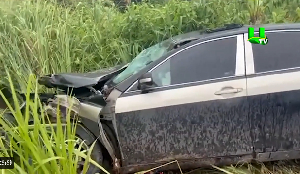- Home - News
- TWI News | TV
- Polls
- Year In Review
- News Archive
- Crime & Punishment
- Politics
- Regional
- Editorial
- Health
- Ghanaians Abroad
- Tabloid
- Africa
- Religion
- Election 2020
- Coronavirus
- News Videos | TV
- Photo Archives
- News Headlines
- Press Release
General News of Friday, 6 June 2003
Source: gna
Soldiers killed by brother on a farm - Witness
A witness on Thursday told the National Reconciliation Commission (NRC) that soldiers killed his brother, Iddrisu Alhassan, when they attacked them on their farm in 1982.
Mr Awudu Alhassan said the soldiers seized their tractor at Napa, near Pusiga, and in the process his brother who was resisting was killed while he was pushed down and he fell on a tree stump that pierced his buttocks.
He said his father died from trauma a month later and he was finding it very difficult to care for his younger siblings and his brother's children who had become squatters in Accra.
Mr Alhassan said they were on the farm when a group of soldiers arrived and asked them to surrender their tractor, accusing them of having acquired it with a government loan.
He said they explained to them that they had acquired the tractor with their own money. They asked the soldiers to accompany them to their father for the receipt of purchase.
The soldiers refused, and a scuffle ensued during which they brutalised his brother.
Mr Alhassan said when he tried to intervene, asking his brother to surrender the tractor to them, the soldiers pushed him and he fell on a tree stump.
The injuries had left permanent scars on him and the Commission reported after inspection that he had three deep scars on his right buttocks, knees and the right arm. His left finger is also deformed.
Mr Alhassan said his brother was left half dead.
He said the soldiers returned a few minutes later to beat his brother again to make sure he was dead, saying he was a Kokomba with spiritual powers, which he would use for revenge if he regained strength.
As his brother writhed in pain, he asked him to fetch him some water from a pot under a tree, but he was unable to do it because of the deep pain he had. Mr Alhassan said he watched helplessly as his brother died.
Mr Alhassan said those who went and buried him said his collarbone and chest bones were broken.
A woman carried him on her back to the village, he said.
When his father reported the murder to the Police, he was asked what they could do for him if soldiers had killed his son.
Mr Alhassan said he agreed to a suggestion from a friend to go to the Bimbilla Hospital for surgery but there was not a single doctor when he went there.
He said while a friend was carrying him on his bicycle to the Salaga Hospital he fell off when he saw a group of soldiers because he was scared of them.
When he fell a boil he had burst and one of the soldiers, who said he was a doctor, dressed and bandaged his wounds. Alhassan said the doctor also gave him medication and eventually had his wounds healed.
Meanwhile, efforts to collect their tractor from the Tamale and Sunyani military barracks proved futile.
Mr Alhassan, now working with the Forestry Department, expressed his desire to return to work on the farm and prayed the Commission to help him locate the tractor.
He said he wanted to give his younger siblings, now porters at the Timber Market, sound education, adding that it was the desire of his father to cater for his siblings from proceeds from the use of the tractor.
Mr Alhassan said he had developed a strong fear for soldiers.
"I don't like meeting them," he said, adding that he would never forgive those who attacked them, killed his brother and seized their tractor.
The Commission, however, appealed to him to forgive them.
Commissioner Christian Appiagyei said: "Try and forgive. You have got the opportunity to express your pain. Forgive them, and leave them to God.
"You have to leave them to God. You have such pain boiled up in you; it can affect your health."
Commissioner Maulvi Wahab Adam referred Mr Alhassan to the kind gesture of the soldier, who treated his wounds, and urged him not regard every soldier as bad.
Opinions









